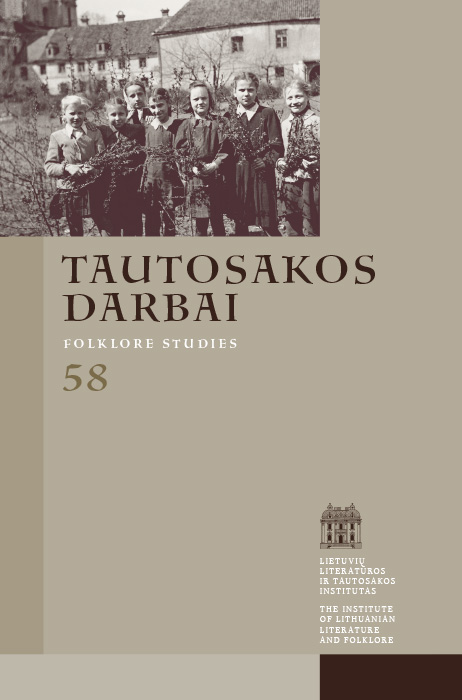Образ воды в традиционных обрядах и песнях Западного Подолья
Santrauka
В статье освещен образ воды в традиционных обрядах и песнях Западного Подолья. Отмечено, что у славян было распространенным поклонения воде, и они приносили жертвы рекам, озерам, колодцам или источникам. Наши предки верили, что вода очищает человека от грехов, поэтому молились над реками, чтобы сбросить в воду свои грехи и потопить их.
Проанализировано применение воды в традиционном мировоззрении западных подолян. Частое использование воды с магическими целями объясняется ее очистительным действием и традиционно религиозными представлениями местных жителей о целебном влиянии на все окружающие вещи и предметы. Важным атрибутом лечебной и хозяйственной магии считалась освященная «иорданская» вода, которая была сильным оберегом от всякой нечисти.
На основе сборников разножанровых песен охарактеризован термин «дунай» в народных песнях Западного Подолья. Вода-дунай часто персонифицируется в форме стихий – дождя, грозы, снега, а также выступает своеобразной интимной гранью между влюбленными людьми.
Vandens įvaizdis Vakarų Podolės tradicinėse apeigose ir dainose
Oleh Smoliak, Pavlo Smoliak, Oksana Dovhanj
Raktažodžiai: vandens įvaizdis, Vakarų Podolė, liaudies dainos, pasaulėžiūra, dainų rinkiniai, nacionalinė kultūra.
Straipsnyje išsamiai aprašomas vandens įvaizdis Vakarų Podolės tradicinėse apeigose ir ypač žiemos ciklo kalendorinėse apeiginėse dainose, – jose labai dažnai aptinkami vandens sąvokos sinonimai. Tiriami folkloro ir etnologijos šaltiniai, leidę atlikti įvairiopą vandens, kaip neatsiejamo žmogaus gyvenimo palydovo, analizę.
Išryškinta vandens svarba senovės slavams, ypač – ukrainiečiams. Senovės slavai garbino upes, ežerus, šulinius ir šaltinius, aukojo jiems aukas. Ukrainiečių protėviams svarbiausia vandens deivė buvo Dana. Jie gerbė ją kaip šviesią ir malonią dievybę, suteikiančią gyvybę viskam, kas gyva. Kaip tik todėl slavų didžiausių upių pavadinimai ir yra kilę iš žodžio dana. Pavasario lietus, o ypač griaustinis turi panašią galią: lietus yra dangiškojo vandens elementas, o griaustinis – dviejų gyvybę suteikiančių pradų – vandens ir šviesos – derinys.
Tiriant nacionalinės kultūros paveldo raiškas, pirmiausia aptariama vandens reikšmė tradicinėje Vakarų Podolės pasaulėžiūroje. Sakramentalinės vandens savybės užfiksuotos daugelyje burtų ir užkeikimų, juose aiškiai pastebimos vandens personifikacijos ir dieviškumo liekanos. Plačiai paplitęs vandens naudojimas magiškiems tikslams aiškinamas tradiciniu vietos gyventojų tikėjimu jo apvalomuoju efektu ir gydomuoju poveikiu visiems aplinkiniams daiktams ir objektams. Pašventintas Jordano vanduo Vakarų Podolėje buvo laikomas galinga apsauga nuo visų piktųjų dvasių, būtinu gydomosios ir ekonominės magijos atributu. Kaip ir daugelyje kitų Ukrainos etnografinių regionų, čia buvo žinomas paprotys kalendorinių žiemos švenčių apeigų metu maudytis vandenyje, kad kūnas būtų sveikas ir stiprus. Šis ritualas gyvuoja iki šiol kartu su kitomis šiuolaikinėmis tradicijomis.
Remiantis senųjų Ukrainos krašto tradicinių dainų rinkiniais, dunojaus sąvoka dažniausiai pasitaiko Vakarų Podolės liaudies dainose. Nustatyta, kad šio krašto dainų poetiniuose tekstuose dunojaus vanduo dažniausiai išreiškiamas sinonimiškomis versijomis: kaip pats vanduo, kaip upė, ežeras, jūra, vandenynas ar kiti vandens pavidalai – lietus, sniegas, taip pat kaip tolimas kraštas. Dunojaus vanduo kaip simbolis ypač dažnas Vakarų Podolės vestuvinėse dainose. Prie vandens, kaip pasyvaus personifikuoto kūrybinio prado, būsimoji moteris ruošiasi vedybiniam gyvenimui, gyvybės pratęsimui. Mitologizuotas dunojaus įvaizdis dažnas ir Vakarų Podolės liaudies baladėse. Jose vanduo veikia kaip bekompromisė dievybė, į savo fatališką glėbį paimanti jaunųjų poras ar atskirus šeimos narius, išdavusius vienas kitą, taip pat kaip greitas, gilus ir nenugalimas vandens srautas, žmogui tampantis mirties vieta. Socialinio pobūdžio tradicinėse Vakarų Podolės krašto dainose dunojaus įvaizdis aptinkamas rečiau; paprastai jis asocijuojasi su „tolimaisiais kraštais“, taip pat gali reikšti ir Dunojaus upės pavadinimą.
